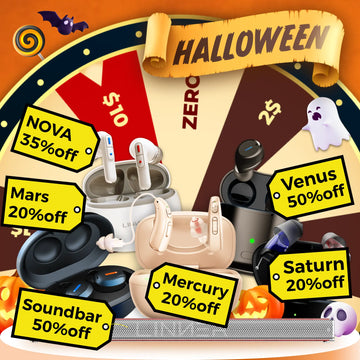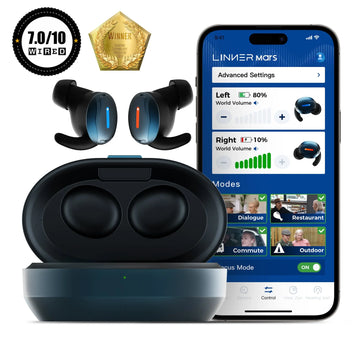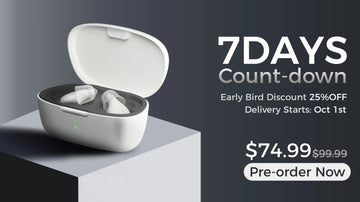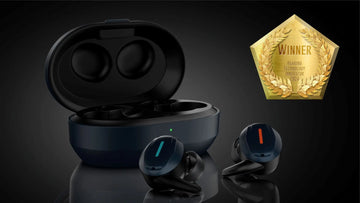
What Hearing Does For Us.
Hearing is one of the primary senses we have as human beings. Hearing helps us navigate through life. We use it for so many things. We receive signals called sound through our ears, that signal is processed through several different kinds of energy as it travels through various parts of the ear before it reaches the brain. This process makes hearing a very unique and delicate feature of our bodies.
The ability to hear affords us the opportunity to do important things like receive oral communication from loved ones, localizing things as they sound off around us, having an awareness of things beyond what the eyes might see (such as a rattlesnake covered in a bush). You can even trace down a gas leak, or figure out how far down a pit is when you can't see the bottom by dropping a rock down it.
With all these amazing things we can do with our hearing, the most important thing for humanity is the ability to communicate and connect with other human beings. With that, there are some situations that can put your hearing in jeopardy. Fortunately, in many cases, there are indicators and preventative measures that can be put in place to reduce the risk of noise induced hearing loss.
Noise Induced Hearing Loss
Noise induced hearing loss is the second most common type of hearing loss, and also the most preventable type of hearing loss. The more we know about conserving our hearing, the greater the likelihood of having more pristine hearing over our lifetime.There are a few indicators that it is too loud and unsafe for your hearing in any given environment.
Two major indicators for steady loud noise exposure include:
1.) If you can't hear someone across the room or have to raise your voice when you’re as close as three feet from them.
2.) You find that you are staring at another's lips trying to understand them through the noise.
Two other good indicators with steady loud noise or sudden impulse noises are:
3.) Pain in the ears during or after the noise.
4.) Feeling like you're underwater with your hearing or that things are muffled after noise exposure.
If you experience any of these in any given environment, that place is too loud.
I recommend regardless of your hearing situation, getting an annual hearing screening. This is a great way of tracking your hearing, and can contribute to a part of your overall healthcare.
Hearing Protection
Fortunately, there are several options when it comes to hearing protection including,preformed earplugs, custom hearing protection, and earmuffs (standard and electronic).
Why do I stresshearing protection? The side effects of hearing loss can be very damaging to an individual's quality of life. With that, there are many social and emotional side effects that come with hearing loss.
Consider these two scenarios:
Scenario 1: It's a family gathering, your mom sits down at the table and attempts to participate in the festivities. Everyone is laughing and getting along and mom appears to also. After a few minutes she gets up, walks into the kitchen and begins to clean. The cleaning could have waited. She didn't get up to clean, cleaning is a byproduct of her
frustration with not being able to understand what is happening in the conversation. She feels isolated in a room full of the people she loves.
Scenario 2: You take your dad to the cardiologist for a check up. When the appointment begins, there are many things discussed, you see your dad nodding to the cardiologist. You and the doctor perceive that your dad is understanding what is being said. After the appointment, you start driving home. You start reviewing details of the appointment and realize your dad didn't get most of what was going on during the visit. After addressing the issue with him he becomes defensive, then distant. It may not be his memory that is an issue here, but rather his hearing.
These scenarios don't have to be mom and dad. This could be anyone who lives with hearing loss; a child, a spouse, a sibling, a good friend. Protecting your hearing now could help spare you from similar social and/or emotional distress.
What To Do If You Already Have A Hearing Loss
Perhaps you are a little late to the game and already have noise induced hearing loss. It is never too late to start protecting your hearing. If you already have hearing loss, starting now to protect your hearing could help maintain your hearing level for a longer period of time.
When you have a stable hearing loss, the ability to work with your hearing could yield better results in the long run. Not only should you protect your hearing through earplugs/earmuffs, but the use of hearing aids is a very effective therapy for noise induced hearing loss. One other thing you want to maintain with a hearing loss aside from a stable baseline, is a strong ability to recognize words. Unfortunately, if hearing loss is neglected, your hearing nerve can be negatively impacted. Stimulating the hearing nerve at the frequencies which you have hearing loss can aid in the maintaining of word recognition ability.
There are many types of hearing aids on the market, and depending on your hearing loss, there could be more or less effective options available to you. LINNER has some over the counter options for individuals with hearing loss. Their hearing aids also have some really cool features such as bluetooth and rechargeable capabilities.
Check out what LINNER has to offer in its product center and hear how the world sounds the LINNER way.
Written by M. Adam Farley





